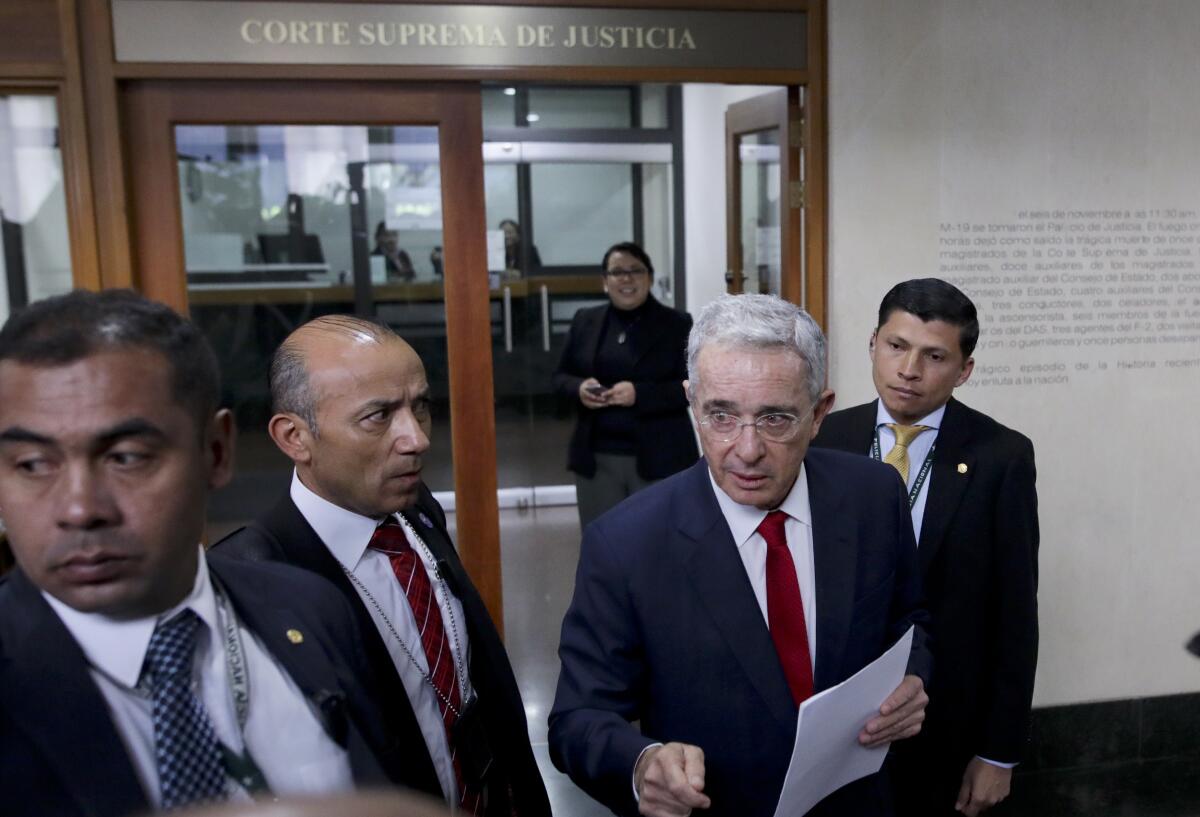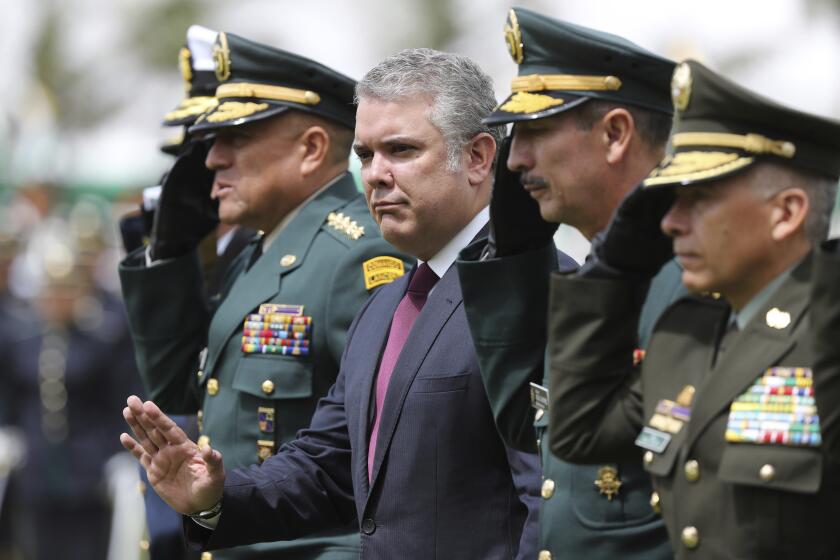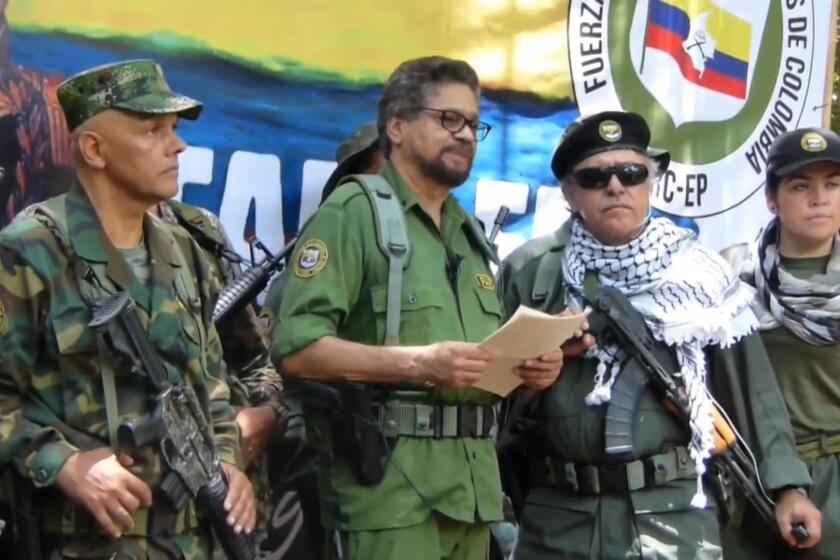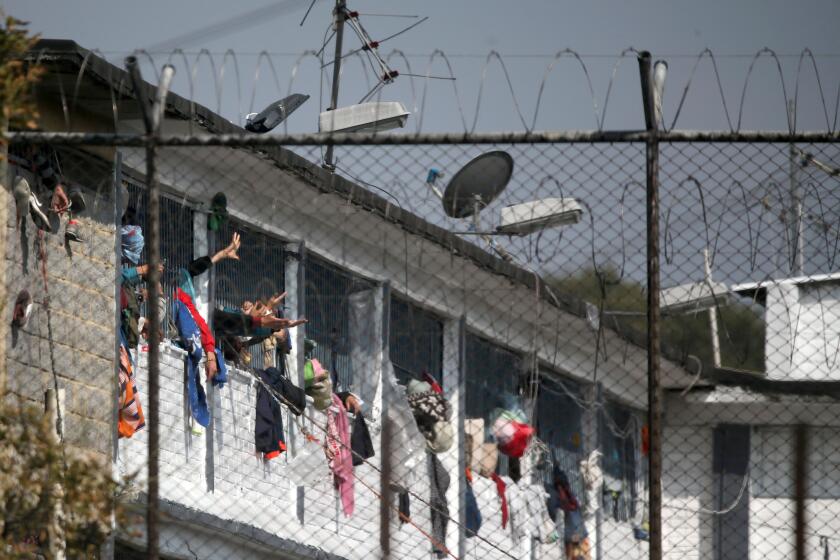Former Colombian President Alvaro Uribe ordered under house arrest

- Share via
BOGOTA, Colombia — Former Colombian President Alvaro Uribe will be placed under house arrest while the Supreme Court pursues a witness-tampering investigation against him, dealing a titanic blow to one of the nation’s most enduring but controversial political leaders.
The high court’s unanimous decision published late Tuesday states that magistrates found “possible risks” of obstruction of justice as they continue delving into accusations that Uribe had a role in bribing potential witnesses against him.
“He will fulfill his detention from his residence,” said Hector Javier Alarcón, president of the Supreme Court chamber handling the case. “And from there he can continue his defense with all the guarantees of due process of law.”
The news touched off a firestorm in Colombia, where Uribe remains a dominant voice in the nation’s highly divisive politics. Critics and civil rights groups praised the Supreme Court for continuing to pursue the accusations against him in a country where the powerful routinely escape punishment for wrongdoing.
“The court is showing that everyone — even the most powerful — is equal before the law,” said José Miguel Vivanco, Americas director of Human Rights Watch.
But the ex-president’s supporters, including current President Iván Duque, decried what they denounced as a political decision by the court. Uribe has not yet been charged and denies the allegations.
Colombians angry with conservative President Iván Duque carry a variety of complaints to the streets, but their protest lacks focus.
“It hurts, as a Colombian, that many who have wounded the country with barbarities defend themselves in freedom,” Duque said. “And that an exemplary public servant who has held the highest position of the state cannot.”
Uribe served as president from 2002 to 2010, overseeing the country at a time of continued conflict with the former Revolutionary Armed Forces of Colombia, or FARC. His political legacy remains highly polarizing, with some Colombians crediting him for weakening the leftist rebels and turning the tide in the country’s long civil conflict, and others decrying his iron-fisted approach. Some of the nation’s most grave human rights abuses took place during his government.
Throughout his career, Uribe has been dogged by allegations of ties to drug cartels and right-wing paramilitaries. The civil aviation agency he led in the early 1980s was accused of giving air licenses to drug traffickers. Declassified U.S. State Department cables from a decade earlier show that American officials were told the up-and-coming politician had ties to cartels, but the U.S. offered Uribe strong support.
The current probe stems from accusations made by Sen. Iván Cepeda, who contends that Uribe was a founding member of a paramilitary group in his home province during the decades-long civil conflict involving government forces, leftist rebels and right-wing bands that left hundreds of thousands dead, displaced or missing.
The U.S. is already struggling to topple neighboring Venezuela’s government. Now rebels with the FARC group claim they are taking up arms again.
Uribe accused Cepeda of slander, but the Supreme Court dismissed the case, instead opening an investigation against the ex-president for purportedly trying to bribe and sway witnesses who could testify against him.
“This causes me profound sadness, for my wife, for my family,” Uribe said on Twitter. “And for Colombians who still believe I’ve done something good for the homeland.”
The case has divided the South American nation and set off demonstrations both in favor and against Uribe prior to the COVID-19 pandemic. Political analysts have been watching it as an important test of Colombia’s justice system, which throughout its history has struggled to hold prominent political and military leaders accountable.
“This really does mean that nobody is untouchable,” said Adam Isacson, an analyst at the Washington Office on Latin America. “And that people can try to hold the untouchable accountable without actually being killed.”
Human rights activists and others call for emergency measures to ease overcrowding in Colombia’s jails after a weekend riot set off by restrictive coronavirus measures left 23 prisoners dead.
Though he left the presidency a decade ago, Uribe has continued to exert his influence over the nation’s politics and was instrumental in launching Duque, a young, relatively inexperienced congressman, into the presidency in 2018.
He led the “no” campaign in 2016 in which Colombians voted against a historic peace accord with leftist rebels that was later modified and adopted.
The Supreme Court magistrates said in a statement that the house arrest order was based on “a great quantity of evidentiary material,” including testimonies and intercepted phone calls, that indicate Uribe’s “presumed participation” in bribing witnesses and procedural fraud. The alleged actions happened after the investigation began.
“I think this is a decision that will help us consolidate democracy in Colombia,” Cepeda said Tuesday. “Today, something in Colombia has changed.”
Breaking News
Get breaking news, investigations, analysis and more signature journalism from the Los Angeles Times in your inbox.
You may occasionally receive promotional content from the Los Angeles Times.
As news of the detention spread, about 50 vehicles circled around the capital city of Bogota, with drivers honking horns, waving Colombian flags and crying out in support of Uribe. Some banged pots and pans from their homes. Downtown, several dozen people gathered to cheer the Supreme Court’s decision.
“From president to prisoner,” one large sign read.
The latest development in the years-long probe comes as Colombia inches toward its expected first peak during the COVID-19 pandemic. The country has now confirmed nearly 335,000 cases and 11,315 deaths. That makes the nation of 50 million ninth worldwide in the total number of coronavirus infections.
“The level of polarization in the country is just going to increase significantly,” said Sergio Guzman, director of Colombia Risk Analysis. “Colombia during the pandemic has had a cause to unite around, and this is going to rip us apart.”
More to Read
Sign up for Essential California
The most important California stories and recommendations in your inbox every morning.
You may occasionally receive promotional content from the Los Angeles Times.
















